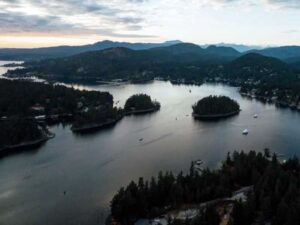The urgency to defend water from corporate abuse

Canada’s weak corporate accountability laws are threatening communities for protecting the water that sustains them.
Water is critical for life. Why, then, are Canadian extractive companies allowed to threaten it and those who defend it?
Today is World Water Day – just one dedicated day to reflect on this vital resource that is too often taken for granted. For Indigenous land and water defenders, water is top of mind every day. The same can be said for the people of Puerto Wilches – a town centred in Colombia’s Magdalena Medio region, a vast watershed fed by the Magdalena River, the largest river system of the Northern Andes.
On February 24, ten peasant and environmental organizations filed legal action in Puerto Wilches against two pilot projects that will frack shale oil in their region. This lawsuit is the latest development in a growing peaceful mobilization led primarily by young women in the region. Joining this movement is Organización Femenina Popular, a KAIROS partner which has been at the forefront of the country’s peace building movement for half a century.
Because peace is at stake here too.
The water and land defenders’ concerns and questions about the fracking projects have been met with death threats by an armed paramilitary group, forcing one young leader to flee the country. This situation is part of a larger pattern. According to Front Line Defenders, 39 percent of the reported killings of human rights defenders in 2021 occurred in Colombia.
Worldwide, collaboration between governments and companies to violently suppress opposition to extractive projects has been well documented, including Testimonio: Canadian Mining in the Aftermath of Genocides in Guatemala, Forbidden Stories and the Gidimt’en Land Defenders UN Submission.
Canadian mining has taken an interest in the Magdalena Medio region. According to an account by Peace Brigades International – Canada, Canacol, a Canadian mining company views the approved fracking pilot projects as positive steps towards its resources prospects in the basin.
According to the lawsuit, the problem is that local communities have not given their consent to the projects and anyone who speaks out puts their lives on the line. They do so because the impacts of fracked oil and gas on their communities, livelihoods and health are too severe.
“Those who come to drill for oil will leave with a full tote, and we will leave with an empty one; when there is no food left here, we will have to leave,” said Carolina Agón, a fisherwoman and vice president of the Fisherfolk Federation of the Middle Magdalena Valley.
The lack of consent, threats and violence violate international law. Canadian embassies are supposed to address these egregious violations, according to Voices at Risk, Canada’s Guidelines on Supporting Human Rights Defenders. Unfortunately, the Canadian government and its embassies do more to support Canadian companies than hold them accountable for human rights and ecological violations.
Canada has fine words to say about environmental protection and supporting human rights and land and water defenders, but its corporate accountability oversight tells a different story. “Canada is open for business” has been communicated loud and clear. It is home to approximately 75 percent of the world’s mining companies, and some of the weakest corporate accountability oversight in the world.
There was some hope in 2018 when the Canadian government announced the creation of the Canadian Ombudsperson for Responsible Enterprise (CORE). That hope turned to disappointment when it failed to give CORE investigatory power. As it stands CORE is solely a mediation body dependent on the good will of companies to turn over documents if they are accused of human rights and ecological violations at their overseas operations.
In 2021, the Canadian Network on Corporate Accountability, of which KAIROS is a member, published The Corporate Respect for Human Rights & the Environment Abroad Act to inform Canada’s development of mandatory human rights and environmental due diligence legislation. The CNCA’s draft provides a legislative framework that would require companies to prevent, report on, and be liable for human rights abuses and environmental harm. Several countries in Europe have already passed similar legislation.
Stronger corporate accountability measures cannot come soon enough. Human and ecological rights defenders worldwide have waited too long for Canada to finally hold corporations accountable for violations against people, communities and the water that sustains them.
Originally published on rabble.ca on March 22, 2022. Gabriela Jimenez is KAIROS’ Latin America Partnerships Coordinator.



